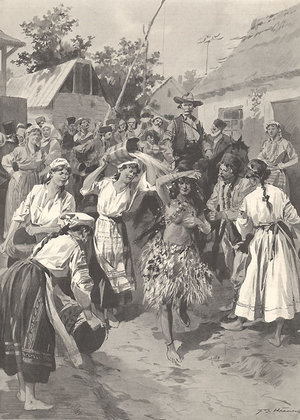| Revision as of 14:30, 22 April 2006 edit62.0.115.46 (talk)No edit summary← Previous edit | Revision as of 12:31, 16 May 2006 edit undoGreier (talk | contribs)2,160 editsmNo edit summaryNext edit → | ||
| Line 1: | Line 1: | ||
| ] | ] | ||
| '''Paparuda''', probably of ] origin |
'''Paparuda''', probably of ] origin, is a ] ], performed in the spring and in times of severe drought. | ||
| A girl, wearing a skirt made of knitted vines and small branches, sings and dances through the streets of the village, stopping at every house, where the hosts pour water on her. | A girl, wearing a skirt made of knitted vines and small branches, sings and dances through the streets of the village, stopping at every house, where the hosts pour water on her. | ||
| The name is probably derived from the south-Slavic goddess ], or as Sorin Paliga suggests, from a local ] substratum<ref>Sorin Paliga: "Influenţe romane și preromane în limbile slave de sud" </ref>. Like the ], another custom Paliga argues is of Thracian origin, the Paparuda is found only at ] (''păpărudă''), ] (''pirpirună'') and ](''peperuda'', ''perperuna''). | |||
| {{Romania-stub}} | {{Romania-stub}} | ||
Revision as of 12:31, 16 May 2006

Paparuda, probably of pagan origin, is a Romanian rain ritual, performed in the spring and in times of severe drought.
A girl, wearing a skirt made of knitted vines and small branches, sings and dances through the streets of the village, stopping at every house, where the hosts pour water on her.
The name is probably derived from the south-Slavic goddess Perperuna, or as Sorin Paliga suggests, from a local Thracian substratum. Like the Dodola, another custom Paliga argues is of Thracian origin, the Paparuda is found only at Romanians (păpărudă), Aromanians (pirpirună) and South Slavs(peperuda, perperuna).
This Romania-related article is a stub. You can help Misplaced Pages by expanding it. |
- Sorin Paliga: "Influenţe romane și preromane în limbile slave de sud" .pdf